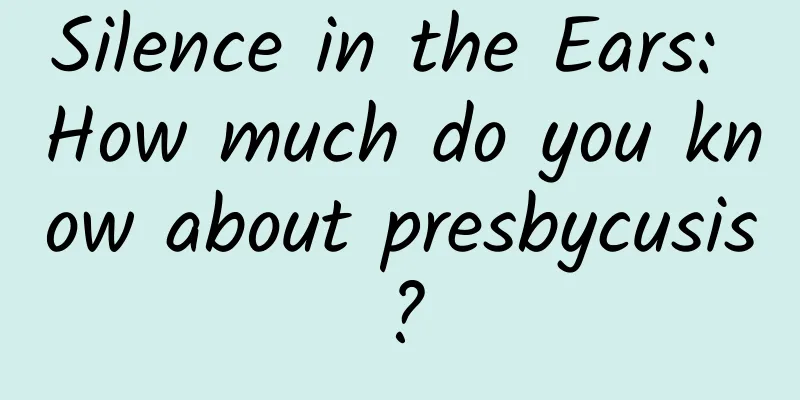Silence in the Ears: How much do you know about presbycusis?

|
Author: Huang Jialu, The First Affiliated Hospital of Naval Medical University Xu Fei The First Affiliated Hospital of Naval Medical University Reviewer: Zheng Hongliang, Chief Physician, First Affiliated Hospital of Naval Medical University In the journey of life, we experience countless sounds: the cry of babies, the laughter of youth, the whispers of love, the noise of family. However, as the years go by, some sounds begin to become blurred or even disappear. Presbycusis, this disease that comes quietly, is affecting the quality of life of countless elderly people. This article will take you to learn about presbycusis so that you can better understand and deal with this disease. 1. What is presbycusis? Presbycusis is a natural hearing loss that occurs during the aging process, mainly due to degenerative changes in the inner ear. About one-third of people aged 65 and above have moderate or severe hearing loss, and the prevalence of hearing loss increases rapidly with age[1]. As my country gradually enters an aging society, presbycusis needs to be taken seriously. Figure 1 Copyright image, no permission to reprint 2. Clinical manifestations of presbycusis 1. Hearing loss occurs with unexplained bilateral symmetrical hearing loss that progresses slowly and progressively. The patient often needs others to repeat what they hear loudly, and the TV volume needs to be turned up very high when watching TV. 2. Difficulty in understanding language: Even if one can hear the voice, one may still have difficulty understanding what is being said and often interrupts. 3. Decreased sensitivity to high-frequency sounds: It becomes difficult to distinguish high-frequency sounds such as women's voices, birdsong, doorbells, and telephone ringing. 4. Tinnitus: When there is no external sound, you feel a buzzing, ringing or other noise in your ears. 5. When listening to people speak, I prefer slow speech and dislike fast speech; I prefer quiet speech and dislike noisy speech. Figure 2 Copyright image, no permission to reprint 3. The harm of presbycusis 1. Decreased verbal communication ability Normal people hear sounds at a frequency of 20 to 20,000 Hz. In the early stages of presbycusis, high-frequency hearing loss (frequency > 4,000 Hz) is the main feature. High-frequency hearing is very important for understanding the details of consonants in language and environmental sounds. For example, consonants such as "z\c\s" usually contain high-frequency components. When high-frequency hearing is impaired, it may be difficult to distinguish these sounds, which in turn affects language comprehension, especially in noisy environments. Verbal communication becomes more difficult. If hearing loss continues to medium and low frequencies (20 to 4,000 Hz), verbal communication is difficult even in a quiet environment. 2. Decreased emotional and social communication abilities. Elderly people experience hearing loss and decreased speech recognition ability, which leads to a lack of interest in things around them. Over time, they become suspicious, jealous, and inferior, and may even develop psychological problems such as anxiety and depression, and become isolated from society. 3. Cognitive impairment Patients with presbycusis have a higher risk of cognitive impairment. Difficulties in hearing and language comprehension lead to communication and social difficulties, which promote the occurrence of cognitive impairment. 4. Decreased risk avoidance ability: Presbycusis patients have a decreased ability to perceive danger warning sounds in daily life (such as traffic horns, fire alarms, reminders from people around them, etc.). At the same time, with aging, the ability to locate the sound source will decline, that is, there will be problems in judging the direction of danger warning signals. 5. Increased risk of falls Severe hearing loss can limit the ability of the elderly to monitor and perceive spatial orientation, leading to balance and orientation disorders, and reduced stability of postural control, thereby increasing the risk of falls and related injuries. IV. Intervention measures for presbycusis For the elderly with mild to moderate hearing loss, wearing hearing aids at an early stage can significantly improve their language comprehension and communication skills, thereby enhancing their social interactions and helping to reduce depression, anxiety and loneliness. However, for the elderly with severe to profound hearing loss, hearing aids may not be enough to meet their needs for improving hearing and quality of life. At this time, cochlear implant surgery may be a more effective intervention. Figure 3 Copyright image, no permission to reprint 5. Daily health care for patients with presbycusis 1. Regular hearing tests Regular hearing tests can detect hearing loss early and take intervention measures to effectively slow down the progression of deafness. 2. Avoid noise exposure. When encountering sudden noise, move away as soon as possible to reduce the impact and damage of noise on the ears. People who work in a noisy environment should wear noise-proof earplugs to reduce the stimulation of noise to the ears. If the living environment is noisy, you can consider installing sound insulation equipment. 3. Optimize environmental facilities: Provide clear and easy-to-read signs, signs and symbols to help elderly patients better navigate and understand the environment; increase light brightness and avoid strong reflections to improve patients' visual recognition ability; install vibration reminders, such as alarm clocks or doorbells, in places or equipment that require reminders to replace sound reminders; provide elderly patients with communication equipment that supports text and images, such as text conversation systems or video call equipment, so that they can communicate with others more conveniently. 4. Healthy lifestyle Try to eat less high-fat foods, eat more fresh vegetables and fruits containing fiber, and fish and beef containing more protein, etc., to supplement vitamins and trace elements such as zinc, iron, and calcium. In addition, walnuts, sesame seeds, peanuts, ginkgo nuts, pine nuts, deep-sea fish oil, etc. have the functions of nourishing the kidneys and brain, opening the mind and improving intelligence, and can also be eaten. Quit smoking and drinking, live a regular life, go to bed early and get up early, and ensure adequate sleep. Doing appropriate aerobic exercise, such as brisk walking and cycling, can improve blood circulation. 5. Avoid damage: Consider using earplugs when swimming or bathing to prevent water from entering the ear canal and reduce the risk of ear infection. 6. Keep your emotions stable and happy. The blood vessels of the elderly are less elastic, and emotional excitement can easily lead to spasms of blood vessels in the ear, aggravating ischemia and hypoxia of the inner ear and worsening hearing impairment. References: 1. Huang Hemei, Liu Lufang, Cai Yuexin, et al. Characteristic study of event-related potentials of complex auditory scenes in patients with presbycusis[J]. Chinese Journal of Otolaryngology, 2023, 21(2): 150-156. |
<<: The invisible "killer" of computer users - carpal tunnel syndrome
>>: If you suspect acute cerebral infarction, should you check MRI or CT? Do you know?
Recommend
Chest pain in pregnant women - reflux esophagitis
Pregnant women usually need to pay attention to t...
How to wear underwear with small breasts
People with small breasts always think of ways to...
Natural calcium for pregnancy preparation
Having a healthy and cute baby is the dream of ma...
How many days after medical abortion can I wash my hair? The authoritative answer is this
First of all, I would like to remind all ladies t...
What are the symptoms of polycystic ovary syndrome?
Multiple ovary syndrome is extremely common among...
Bladder location diagram for women
People may not pay much attention to the bladder,...
What medicine should pregnant women use for vaginitis
During pregnancy, the hormone levels in the body ...
How can girls prevent hair loss?
Human hair loss is a common physiological phenome...
Causes of itchy genitals in women
With the arrival of autumn and winter, the skin w...
Guizhi Fuling Pill for breast hyperplasia
Female friends have always had problems of one ki...
Can myopia and presbyopia cancel each other out? Be careful not to see clearly at both near and far!
Myopia and presbyopia Can they offset each other?...
Why do women have blood in their urine, frequent urination, and painful urination?
It seems that a lot of things happen in this soci...
HootSuite: Twitter Advertising Statistics for 2022
Twitter revenue grows 37% to more than $5 billion...
Is it good for women to eat donkey-hide gelatin for a long time?
Donkey-hide gelatin is a very good tonic for wome...
What are the early symptoms of breast lipoma?
I believe that for many female friends, having pl...




![[Doctors Talk About Medicine] Lungs are life, enjoy breathing - basic knowledge about chronic bronchitis and chronic obstructive pulmonary disease](/upload/images/67f17b97e7b7d.webp)




